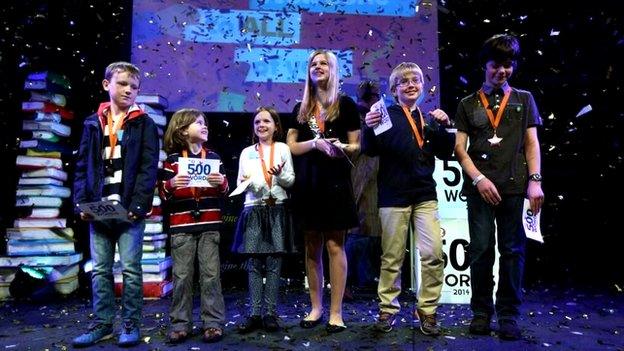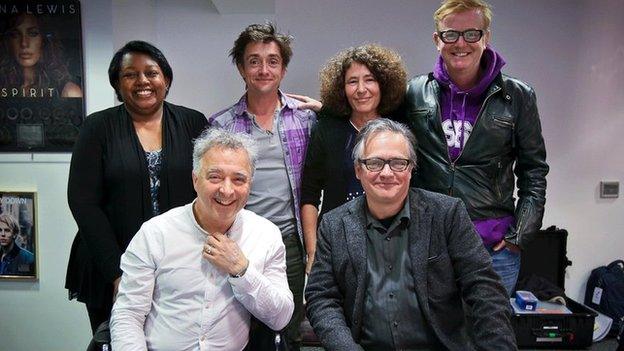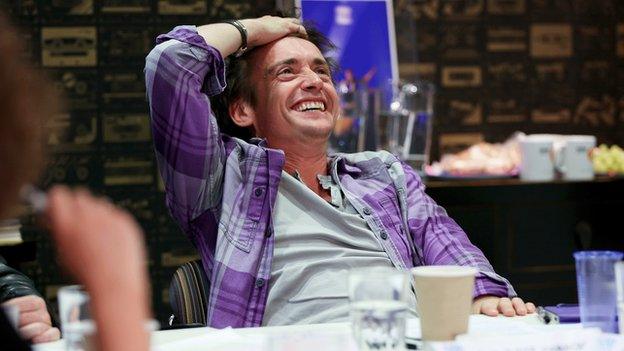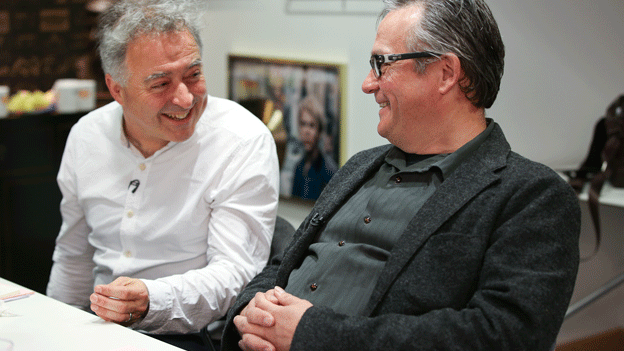Challenging children's imagination in 500 Words
- Published

The winning short story writers were announced live on BBC Radio 2 from the Hay literary festival
"You are dealing with something that is practically uncontrollable - children's imagination."
That's the critique of Richard Hammond, chair of the star-studded judging panel which had the task of picking the winners of this year's BBC Radio 2 500 Words competition.
The contest challenges children to write an entire story in just 500 words and this year there were a record 118,632 entries, with judges having to choose a top three in two age categories: nines and under and 10-13.
The 50 shortlisted children were invited to the Hay Festival for the live unveiling of the victors, with the gold winners receiving a stack of books the same height as DJ Chris Evans - 6ft 2ins (1.88m).
The wide-ranging topics tackled by the six winners range from minotaurs to World War One, with feelings and thoughts of loss and mourning a major theme.

Winners
13 and under
Gold Susannah Ames, 13, - All The Time in the World
Silver Nicholas Lockhart, 12, - Diary of a Minotaur
Bronze Owen Storer, 13, - Albert Onions and Me
Nine and under
Gold Daniel Martlew, 9, - Lost Underground
Silver Robert Jordan, 7, - No Ideas George
Bronze Juliette Lea, 9, - Should Bes

The competition is the baby of DJ Chris Evans, who launched it four years ago and has seen it grow into an institution.
"I think that things that are contemplated and take longer to do are fighting against the soundbite mentality of the world," said Evans on the importance of the competition.
Hugh Bonneville reads nine-year-old Daniel Martlew's Lost Underground
"We've got to keep pushing the door open just to keep the balance level. It's not as if this is going to make more people write than ever before but at least it may maintain a certain level of people writing and reading."
The judging panel features a host of award-winning children's authors including the children's laureate Malorie Blackman; Frank Cottrell Boyce - who was also co-writer of the 2012 Olympic opening ceremony; author and actor Charlie Higson; and Horrid Henry creator Francesca Simon.
Paloma Faith reads 13-year-old Susannah Ames' All the Time in the World
Higson, who has been involved in the competition for three years, said: "We are always being told that children don't like reading or writing or anything to do with school and are idiots and I saw that there was this huge response and I thought I'd love to be involved in that."
Higson, who has written a number of books based on the young James Bond as well as the Enemy series of children's novels, has worked with many children through 500 Words and education programmes.

Judging panel - Clockwise from back left: Malorie Blackman, Richard Hammond, Francesca Simon, Chris Evans, Charlie Higson, Frank Cottrell Boyce
Of the types of children who get involved in 500 Words, he said: "They are all different, some of them say 'my teacher or mum mentioned this thing and I thought I'd have a go but I don't usually write', others say 'I write all the time'.
"The kids are as varied as the stories are. That's what I like about this - no two stories are the same and no two kids are the same."
Heated debate
A team of 3,500 book-loving teachers and librarians helped read every story, whittling them down for the second round. The Scottish Book Trust then had the unenviable task of sifting these down to a final 50 in both categories.

Richard Hammond has the deciding vote for a number of the winners
It was then down to the judging panel to choose their favourites and give a "passionate promotion" of their favourites in a locked down room.
"One or two of them instantly jump out, and that's great," said Higson "It's either got a good idea or its really well written.
"One or two of them you have to come back to. Here, the judges come in with all their favourites and we get to read out some some out loud and that really helps you to see things that you might have missed.
"Inevitably, because they are only 500 words, there's the feeling they are like a joke - short, punchy. They've got to put across a point quickly and strongly. Some of the other ones don't have that initial hit you round the head impact."
The mood in the judging room was often heated, and many of the decisions were far from unanimous.
There were disagreements over what constituted funny or original - with splits down the middle having to be decided by Hammond in his role as head judge.
He admitted it could be intimidating to chair a prize with a panel of esteemed authors.
"Yes it could be terrifying, overwhelming and daunting but I prefer to take it as an opportunity to spend a day with some really amazing minds," he said.
"And this is as close as you'll get to an unedited, unfettered mind of a child, which is great."
Some of the biggest discussions between the team was what should triumph - originality or good writing, and should the stories necessarily be inspiring to other children.
According to Evans, who doesn't take part in the judging, innovation is all-important. The judges were in agreement that, this year, there was a problem with derivative ideas.
The feeling was that the older writers wrote for their teachers or the judges, while the younger ones wrote for themselves.
"Originality, originality, originality - I think that is key," said Evans.
"It's so evident that the nines and under are always more original than the 10s and over, and when do you start worrying about what people think of you? When you get older."
The Oxford University Press analyses the 50 million words contained in the stories to discover general and emerging themes.
Its "Children's Word of the Year" was minion, thanks to the yellow creatures in last year's hit animation Despicable Me 2.
Emmet from The Lego Movie and references to the video game Minecraft also featured heavily in the statistical analysis.
Vineeta Gupta, head of Children's Dictionaries at Oxford University Press, said: "It is fascinating to see that children's vocabulary has been enriched by games and blockbuster films. Who would have thought five years ago that children would be writing about minions, portals, and ocelots?
"These are not everyday words, yet children have understood their meanings, adopted them, and are using them in their own new and creative contexts. Watching movies or playing narrative games is having a positive effect on children's writing."

Charlie Higson (r) jokes with Frank Cottrell Boyce, but the judging was at times heated
The publishing industry is having a hard time, with the advent of discount marketplaces such as Amazon and the e-book revolution. But Charlie Higson holds out hope for the future.
"Like all book markets it's struggling," he said, "but children's fiction is probably the one that's been hit less hard by the changes in publishing.
"I certainly think we are in something of a golden age of children's writing. There are so many good books but possibly that's a problem. When I was growing up, there weren't many kids books around.
"Now, particularly since JK Rowling, a lot of writers no longer think 'oh, children's books that's not very respectable. I should write for adults'."
But Higson also understands that books are fighting a battle for attention.
"There are a lot of great books for kids but there are also a lot of other things for children.
"When I was young there was like an hour of kids TV a day, there were no DVDs or computer games or laptops so it was easier for books to find a place, and the thing about all these things children have today they are brilliant, they are fantastic fun.
"I play a huge amount of computer games - so it's just a question of helping kids find the time to do all that and to find the time to fit in a bit of reading too."